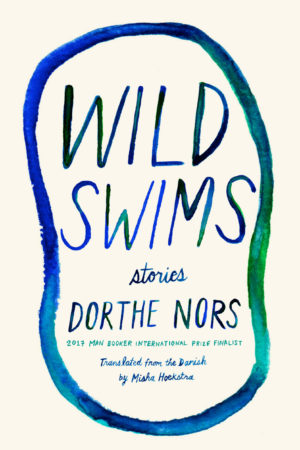Wild Swims
by Dorthe Nors, translated by Misha Hoekstra
reviewed by Gabriella Martin
“You can always withdraw a little bit further,” reads the epigraph to Danish writer Dorthe Nors’s latest, exquisite collection of stories, Wild Swims, carefully translated into English by Misha Hoekstra. It’s a matter-of-fact statement that reads as both an affirmation of our present moment of pandemic-induced collective withdrawal, and as an invitation, pulling us deeper into the currents of these brief, sharp, darkly comic stories. And it’s about time we dove into Nors’s writing. A major voice of contemporary Danish literature, her stories have appeared in venues such as The New Yorker and Harper’s, and her novel Mirror, Shoulder, Signal (also translated by Hoekstra) was shortlisted for the 2017 Man Booker International Prize.
Wild Swims features Nors at her best. These fourteen stories leave questions unanswered, offering no clear or single resolution to their conflicts. They are kaleidoscopic: a slight shift in perspective leads to an entirely new reading. At the same time, Nors is the queen of concision. Most of the stories in Wild Swims are around five pages long, within which Nors creates complex characters and condenses entire worlds into single sentences. One narrator observes, “there isn’t much more to say about that week in London other than that I spent a week in London when I was eighteen,” which somehow says it all. The tension Nors—and Hoesktra—create between concision and multiplicity, between contraction and expansion, is in part what makes this collection so impressive.
Nors’s treatment of memory also stands out. The stories are less about the events that happen in them and more about how characters respond to what is happening through the lens of their own experiences and memories—which remain unknowable to those around them but are offered to the reader in fleeting, blurry glimpses. Take, for example, “By Sydvest Station.” While Kirsten and Lina go door-to-door, fraudulently claiming to collect donations for the Cancer Society, Kirsten stews over a biting comment an ex-lover has just made to her. While this informs her entire experience of the day, she mentions nothing of her torment to her cancer-scam-partner. All the while, the women discuss how “you never know what awaits you when you knock on someone’s door.” The thresholds, boundaries, and doorways between people are at the center of this story, and the collection more broadly. The stories are international in scope, set between Scandinavia and North America, but no matter their geographical setting, it is each character’s inability to fully know another, or to be fully known themselves, that situates them inside their own unique forms of aloneness.
Hoesktra perfectly recreates Nors’s particular language, which is straightforward and precise in vocabulary but often capricious in structure, with abrupt shifts in tone and mid-sentence twists that leave the reader somewhere entirely (but pleasantly) unexpected: “Their flat smells intimate, and filth is one thing, but their cleaning solutions seem like something you don’t really want to know about either, and ‘Hello, we’re from the Cancer Society, would you like to support our work?’” The result of this syntactic sashaying is a consistent, wry humor throughout the collection. “While these descendants of the Scandinavian exodus gnawed the last soft dough from their pizza crusts, I set their names in historic perspective,” observes one character while visiting the Minneapolis branch of a Danish company; in the titular story, in reference to an indoor pool, a character goes “calmly over to the lip of the shrieking water-hell.” Nors’s humor is present not just in the language, but also in the situations explored in the stories: a woman befriends an ex-lover’s mother in rural Norway, a man gets trapped into attending the eightieth birthday party of his one-night stand’s aunt. However, walking hand-in-hand with this humor is darkness: there are no happy endings here, just unsettling ones.
This sinister underside is deftly explored through gender relations. Wild Swims’s male protagonists are, at best, a bit pathetic, and at worst vile. The back-to-back placement of the stories “Pershing Square” and “Honeysuckle” offers an effective juxtaposition. In the first story, a woman frazzled by the chaos and oppressive heat of Los Angeles resents being told by a psychologist to downplay her intellect, “‘because men were afraid of rejection—and because their penises meant so much to them—they were anxious that a smart woman might laugh at them because they masturbated out in the bathroom.’” In the next story, a misogynist with a kink for withdrawn women (and who would absolutely resent the LA woman’s intellect) masturbates “in the bathroom, in bed, in the greenhouse in his parents’ yard during Sunday dinner,” set into a frenzy by a blind woman he has met, whose face, according to him, “seemed to exist only with his help.” There’s an almost sadistic pleasure in watching these men dig themselves into holes, where Nors intentionally leaves them with no interest in digging them out. Wild Swims is biting in this way. But there is softness in this collection, too; by reminding us that aloneness is a condition we all share, Nors offers unorthodox comfort amid isolation. Sure, we can always withdraw a little bit further, but chances are we’ll bump into others along the way.
Published on March 5, 2021

